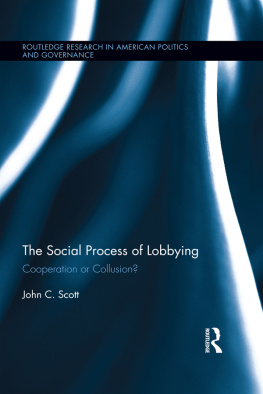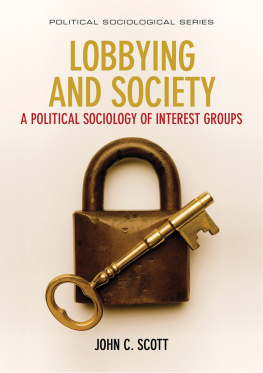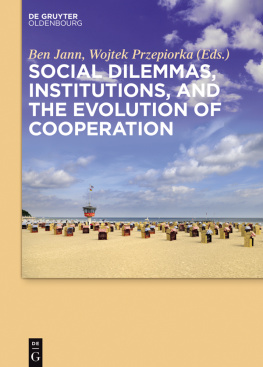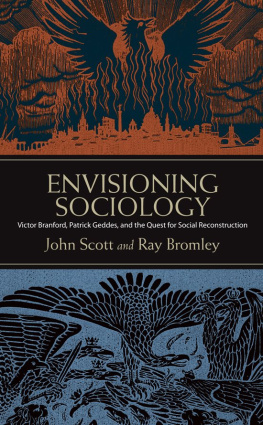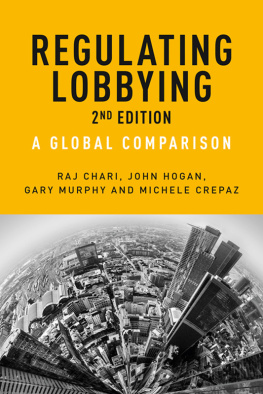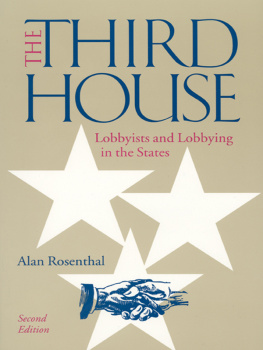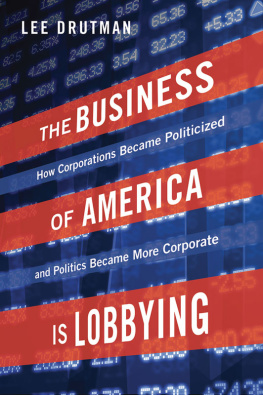John C. Scott - Social Process of Lobbying: Cooperation or Collusion?
Here you can read online John C. Scott - Social Process of Lobbying: Cooperation or Collusion? full text of the book (entire story) in english for free. Download pdf and epub, get meaning, cover and reviews about this ebook. year: 2014, publisher: Routledge, genre: Politics. Description of the work, (preface) as well as reviews are available. Best literature library LitArk.com created for fans of good reading and offers a wide selection of genres:
Romance novel
Science fiction
Adventure
Detective
Science
History
Home and family
Prose
Art
Politics
Computer
Non-fiction
Religion
Business
Children
Humor
Choose a favorite category and find really read worthwhile books. Enjoy immersion in the world of imagination, feel the emotions of the characters or learn something new for yourself, make an fascinating discovery.
- Book:Social Process of Lobbying: Cooperation or Collusion?
- Author:
- Publisher:Routledge
- Genre:
- Year:2014
- Rating:5 / 5
- Favourites:Add to favourites
- Your mark:
- 100
- 1
- 2
- 3
- 4
- 5
Social Process of Lobbying: Cooperation or Collusion?: summary, description and annotation
We offer to read an annotation, description, summary or preface (depends on what the author of the book "Social Process of Lobbying: Cooperation or Collusion?" wrote himself). If you haven't found the necessary information about the book — write in the comments, we will try to find it.
Social Process of Lobbying: Cooperation or Collusion? — read online for free the complete book (whole text) full work
Below is the text of the book, divided by pages. System saving the place of the last page read, allows you to conveniently read the book "Social Process of Lobbying: Cooperation or Collusion?" online for free, without having to search again every time where you left off. Put a bookmark, and you can go to the page where you finished reading at any time.
Font size:
Interval:
Bookmark:
- Embedded social relationships and trust-based social norms underpin everyday interactions among policy actors.
- These relationships and norms have concrete impacts on the policy making process.
- Social relationships and norms inhibit participation in the political process by outside actors.
Interests in Transition
Heath Brown
Gastn Espinosa
Petitioners as a Reflection of Society
Edited by Shauna Reilly and Ryan M. Yonk
Stephen Brooks
The Chimeric Imagination of Ronald Reagan
Justin D. Garrison
Suddenly, All the Truth Was Coming Out
David A.J. Richards
The Role of Religious Coalitions in the Political Process
Katherine E. Knutson
Too Much Liberty and Too Much Authority
Thomas R. Pope
George Hawley
Science for Citizenship
Susan P. Liebell
The Uphill Elections of Italians and Mexicans to the U.S. Congress
Miriam Jimnez
The Good, the Bad, and the Ugly
Heather K. Evans
Representation at the Intersections
Becki Scola
Christina E. Bejarano
An International View of the White House
Edited by Michael Patrick Cullinane and Clare Frances Elliott
Money, Elections, and Voters after Citizens United
Conor M. Dowling and Michael G. Miller
George Hawley
David B. Holian and Charles L. Prysby
Cooperation or Collusion?
John C. Scott
by Routledge
711 Third Avenue, New York, NY 10017
2 Park Square, Milton Park, Abingdon, Oxon OX14 4RN
324.40973dc23
2014030804
ISBN: 978-1-315-85562-2 (ebk)
by Apex CoVantage, LLC
Font size:
Interval:
Bookmark:
Similar books «Social Process of Lobbying: Cooperation or Collusion?»
Look at similar books to Social Process of Lobbying: Cooperation or Collusion?. We have selected literature similar in name and meaning in the hope of providing readers with more options to find new, interesting, not yet read works.
Discussion, reviews of the book Social Process of Lobbying: Cooperation or Collusion? and just readers' own opinions. Leave your comments, write what you think about the work, its meaning or the main characters. Specify what exactly you liked and what you didn't like, and why you think so.

